#i suppose i'm mostly reiterating what we should probably know already
Text
I feel like people must’ve forgotten how objectively horrifying Spamton NEO is, like on a psychological level. Once he goes NEO, that’s the point of no return. The only way out of it for him is to basically die.
Not to mention Puppet Scarf’s flavor text:

Yes, Ralsei can no longer cast healing spells as effectively with it equipped, but think of the implication; that’s Spamton. By the time he goes NEO, he gave up on healing and making amends. By this point, he’d rather go out and kill everyone who wronged him (or he thinks they did) than seek forgiveness, or forgive them himself.
And in Snowgrave, he has no problem with letting (or even encouraging) someone commit mass murder if he can take advantage of the situation.

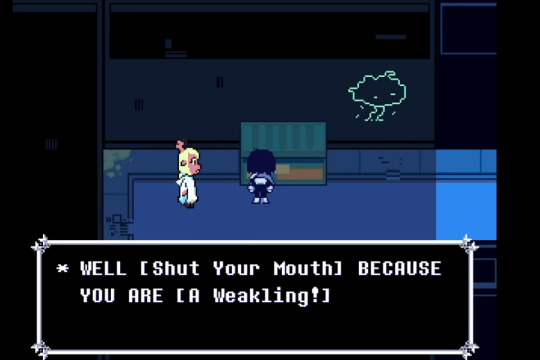

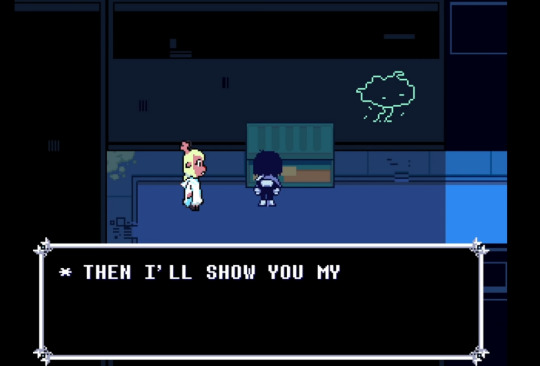
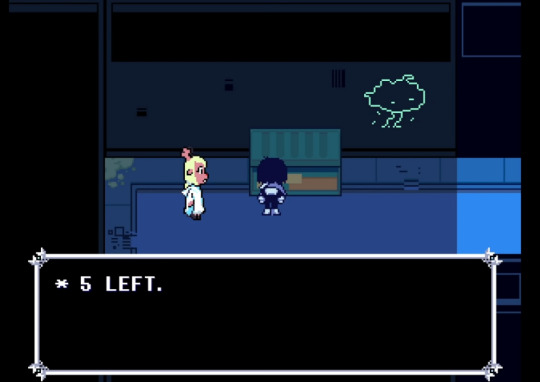
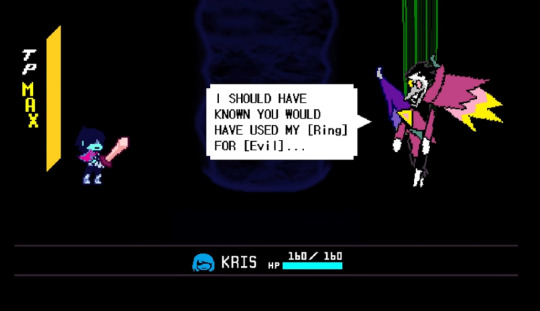
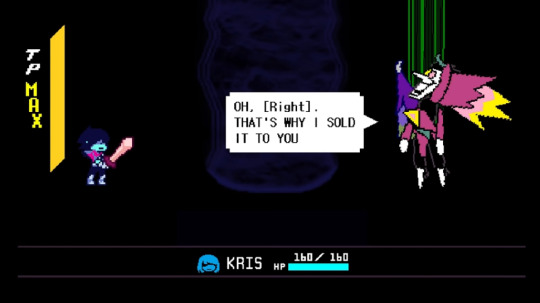
He may call you out on it, but by that point he’s mostly projecting his own self-hatred onto Kris.
But if we adhere more closely to the normal Ch2 route, it’s implied that he still had murderous intentions with NEO.
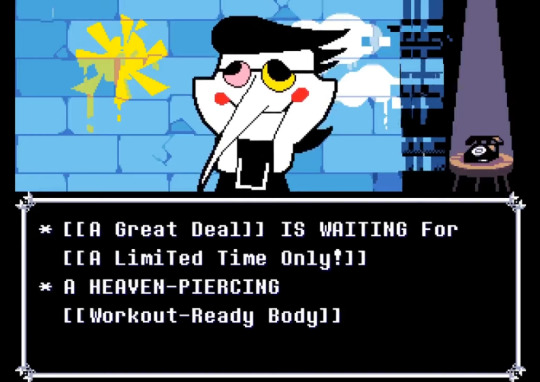
And even if you end the fight by sparing him and get the Dealmaker instead, it's already too late for him. He went NEO, and there's no other way it can end for him.
In other words, NEO spells his doom.
#deltarune#spamton#spamton deltarune#spamton g spamton#spamton neo#deltarune analysis#haz says a thing#i suppose i'm mostly reiterating what we should probably know already#but fried meme dinner i guess#my man is fucked up#and that’s why we love him#i feel like redemption/saving him is somewhat possible#but it would involve a whole chapter’s worth of alternate character development
318 notes
·
View notes
Note
Hey, I have kind of hc'ed myself into a corner. I'm working on a oneshot based on someone else's art, which takes place at an office christmas party. Somewhere along the way I started hc'ing one of the chars as jewish tho. I went through your tags and it appears to me that it wouldn't actually be a problem for him to be at the party, as long as it's not overly religious? (Which it isn't. It's just a "christmas party" because of christian culture.) My main question is now, what would be good, small ways to keep the character noticeably jewish, esp in a relatively short story? My thoughts so far were that he'd probably object to someone putting a santa hat on him? And/or his colleagues might thank him for taking some extra shifts during christmas itself so they can stay home (in exchange for covering shifts for him during Chanukah? I know it's not a major holiday but around the same time so an exchange would make sense?) Mostly I'm just looking for every-day details, maybe something you guys would like to see more of? Thanks in advance!
Jewish character attending office Christmas party, also Chanukah
I like thanking him for working on Christmas — but working for him "on Chanukah" really doesn't make a whole lot of sense because you wouldn't be missing work. Recognition of the holiday is done mostly through lighting candles at night. If you want the exchange to be fair, they could always have traded just for him traveling at a different time — like oh, thanks for working for us on Christmas, now I'll work for you the following Tuesday — a day off is a day off.
Mileage may vary on the Santa hat. I wouldn't necessarily have a problem with someone putting that on my head if I was already at a Christmas party but someone else might, so I'm curious what our Jewish followers will say about this in the notes.
He can maybe bring something traditional like rugelach or babka as his contribution to the party's dessert potluck... or if you want something specifically seasonal, jelly donuts (which are a Chanukah thing for some people.)
--Shira
I'll start with a caveat I've made before: Jewish people are varied. Our practices, views, and choices are manifold.
All of that being said, there's no way I would go to a Christmas party. I know what you mean when you describe the party as not being overly religious but "Christmas because of Christian culture." From where I'm sitting though, you can take the Jesus out of it, but it's still a Christian holiday, Santa, trees with lights, caroling, Christmas music (even the heaps of songs written by Jewish people) are all still Christian culture. Christian being the operative word, and with my operative word being Jewish.
Now, let’s say I went to a secular, winter-party. We'll imagine that there are no decorated trees, no gifts being given, just snowflake decor and mulled wine. If someone at that party (or any other), who knew that I'm Jewish, tried to put a Santa hat on my head, I would be immediately arguing with my fullest, deepest voice. Christmas is pervasive, it's music in the stores, lights on every street, public buildings closed, and everyone wishing you a "Merry Christmas," and then angry when you smile and say "thank you, but I celebrate Chanukah!" Even if you use your cheeriest voice, and your happiest smile. It's great that other people are so excited, and happy at the time, but it can be exhausting to have to be constantly reminded that I am largely forgotten, and when I am remembered, I'm expected to assimilate. Why would I put myself through an extra portion of that?
I don't mind one, or two examples of stories where Jewish people go and participate in Christian holidays, plenty of us do! But it's all the time, in books, tv, movies, comics... I'm exhausted by the premise, and frustrated as the overabundance of that particular story contributes to the broader culture's expectation that I should be willing to be culturally Christian for a night, a week, a month, or more.
-- Dierdra
Like Dierdra, I have largely stopped going to these, but I would reiterate that there are many reasons why people would go. For example, being Orthodox, it’s hard enough not being able to join colleagues for drinks on Friday night or dig in when a manager takes pity on us and orders pizza. I don’t want to be that Jewish girl who never gets involved.
With this in mind, I would avoid using refusal to take part, or even getting annoyed at being forced to take part like with the Santa hat, as the parameters that define your character’s Jewishness. Especially at Christmas, where there’s already the common assumption that only the biggest killjoys refuse to celebrate.
Because of the seasonal aspect, this is one of the few times that I actually would consider Channukah to be one of your best options for introducing Jewish identity. Pre-Covid, I would often bring a dreidel and a box of chocolates to my very non-Jewish office during Channukah, and anyone who wanted could play with me at lunchtime. There’s no reason this couldn’t be taking place at a Christmas party, since it’s a very simple game to learn and most people find it fun the first few times. If you can, try slipping into the dialogue that this isn’t the only holiday the character celebrates though, since we are very tired of seeing that.
If you’re confident in your ability to write microaggressions, you could also create one or two uncomfortable moments for the character, because when people get drunk they often ask really weird questions about your religion and culture. For example, I was once at a work party where someone managed to get out of me (despite my attempts to dodge his invasive questions) that I was Jewish, and he immediately asked me why all the Jews in a particular ultra-Orthodox neighbourhood drove similar cars. The same night, my boss’s boss told me three times that he had loved going to Israel as a kid and thought of it as Christian Disney Land. You don’t have to get into microaggressions if this is just supposed to be a short, festive story, but I think it would feel very real and refreshing for a lot of Jewish people to see those experiences validated.
Other than that, I also like Shira’s suggestion of bringing Jewish food. I’ve turned up to many a ‘winter holiday’ party with latkes, even if I was the only Jewish person there. Covering Christmas day and getting a day back later is also very common, although I agree with Shira this wouldn’t be for observance of Channukah. It would either be a random day in the near future, or saved up for Passover, which is the next holiday requiring time off work.
- Shoshi
389 notes
·
View notes
Note
Hi there! I've got a question, what is Tony's threat level according to other intelligence agencies after all the snafu of TWIFFON? Like does CBI and FBI' opinion differ from Interpol or MI6? And what about SI legal? Do they have specific lawyers on threat watch and Pepper too? At this point I'm even wondering what does Bill Gates and other competitors think of SI legal? Are they crying in opposition? What was president' reaction over SHIELD' fall and Tony? What about FoxTV and Twitter?
Disclaimer: TWiFFON was created with accidental world domination as an end goal long before I posted the first chapter, as a spitefic in response to the fandom’s reaction to Civil War, and Tony’s treatment in particular. I am a very broke student who’s doing this for fun, as stress relief between classes and whenever I have the time. I am not a political science major, or economics, or business. I have absolutely no clue as to how a corporation’s run, or international law, this is just me derping around in the MCU and keeping my fingers crossed that comic book science covers for whatever I’ve missed and hoping for the best. [So if I screwed something up on the legal side, you’ll know why.]
Okay, now that that’s taken care of: the gist of what you’re asking can be found in a post I did a while back, on power dynamics behind the scenes.
[more under the cut, because you guys know how I roll and RIP whoever’s on mobile otherwise. Because this turned into surprise SI meta.]
To sum up from that post:
Tony and Co. are pretty damn formidable, but PR’s mostly on top of things to make them seem like they’re harmless. Whether or not it works depends a lot on a myriad of factors, including economics, political leanings, and location, and as I’ve said before the US has a different view on Tony than the rest of the world does. I’m not going to delve into specifics [this was supposed to be crack, dammit!], because of the above, but given that in real life the heavy pull that corporations have, I’d like to think that in terms of suspension of disbelief I’m not doing too badly.
I mean, sure, there’s always going to be opposition, but a) Stark Industries used to be in the weapons manufacturing business, so they’re used to cutthroat politics even if they changed tracks a while back [and we’ve seen it happen, and will continue to do so in the fic], and b) I haven’t even touched on how comic book science influences things, like how Wakanda’s existence throws a wrench into International politics or Howard Stark’s infamous legacy [which is a story for another post].
I mean, in real life, the US really did a number on Latin America in the ‘60s and ‘70s. Now imagine what could’ve happened if SHIELD was also out there fucking shit up.
Or how Vietnam must’ve been like, because guess who probably got some of the contracts for supplying the military with munitions? Or just what might’ve led to a different sociopolitical landscape, because how would have Captain America’s image have influenced the Red Scare? Would Howard’s influence [via SHIELD, or otherwise] led to a different way of dealing with Iran? He was known to have participated in the Manhattan Project, so that’s already one change felt: how else did he make it into the history books?
Just…I could go on. I haven’t watched any of the tv shows, but…well. You get the idea. How influential was Howard, even before Tony was born? Bits and pieces’ll show up in TWiFFON, and some other things I write, but…well. You get the idea.
Also: I have no clue how economics work in real life [again, broke student here, statistics’re more my speed at the moment], but…if NAFTA and the TPP can exist, in real life, and royally fuck up international economies because profits, then a fictional company that’s been kicking since before World War II and is currently headed by some of the sharpest minds in their generation is, again, not too far out in terms of suspension of disbelief.
After all, Stark Industries is a family company. [Well…kinda.]
Sure, at the time it was also for weapons manufacturing, but still: Tony grew up knowing he’d inherit it someday. I cover this a bit in the PR interlude, and I think you guys might be able to see hints of it in the Legal interlude as well, but Tony grew up with Obadiah being a larger presence in his life than Howard was, and I forget if it got cut or not but in one draft the PR representative was also a known face.
So, Stark Industries’ presence has been a constant in Tony’s life. Stemming from childhood, even, and we can see its influence early on, too: remember how he was 17 when he worked with PR to keep stock prices from plunging and thus avoid layoffs?
Tony’s very possessive of what he has, when it comes to people. Add in a dash of spite and his issues, and you get a company that hasn’t changed its stance on vacation time in decades, or health insurance coverage for its employees since before the Reagan administration, and offered roughly a month of paternity leave shortly after Tony took over the company. [Daddy issues for the win.]
Sure, it cut into profits a little, but iit wasn’t like he was hurting for money. And Tony always had a patent or two ready to shut up the board whenever anyone tried to complain and the ‘hey our productivity’s way higher than the competition’ wasn’t enough of a reason to keep things as they were.
Plus, remember how I said it part of it was out of spite? Tony’s mentally flipping his father off the whole time, but he’s also very smug about it because ha, that that, Hammer and your stupid budget cuts!
And all the while, Forbes and the Wall Street Journal are all but gushing about how SI’s employee satisfaction rates are off the charts. Tony tries to make it background noise, because really, it should not be unusual to offer that much maternity leave, seriously, what is wrong with you people…and in doing, so kinda misses out on some things.
Like, for instance, just how diehard loyal Stark Industries is.
There’s a reason everyone in SI’s so rabid about corporate espionage, and maybe money can’t buy everything but overtime pay sure goes a long way sometimes and turns out that on-site daycare is a smash hit, who knew? It’s not just the pay, really; it’s the company picnics with a line-item for property damage, it’s the rivalry Legal and R&D have that has the rest of the company eating popcorn, it’s in the top-of-the-line coffeemakers in the break rooms and free entertainment whenever Hammer Industries tries to do a thing and fails epically.
Add in the way SI’s got some very strict policies on stuff like sexual harassment [because Tony may act like a playboy for the cameras but he respects women and won’t stand for it], and JARVIS’ assistance, plus Pepper being Pepper, and you’ve got a company full of highly motivated, hypercompetent people all united under the same banner and an employee satisfaction rate that makes the competition go equal parts ‘that sounds fake but okay’ and ‘just what the hell do these people even eat?!’ and that’s why, in the legal sense at least, Tony’s all but untouchable. Business-wise, SI’s feared and envied because Legal’s Seen Some Shit and PR’s handled two generations of Starks and good fucking luck getting a spy in. when JARVIS is in charge of background checks and all fellow coworkers are willing to go the extra mile if it means showing up Hammer. [And I haven’t even mentioned SWORD yet.] Again, SI used to be a weapons company. Sure, they’re doing more civilian-friendly stuff now, but that kind of legacy is really hard to erase even if you tried. You don’t get to the top by being kind, in that industry […I think; again, broke student here], and we’ll see that aspect crop up more as we go along in the fic, too.
Just…where other companies took a colder turn, went more for profits and took advantage of the tax cuts, Stark Industries didn’t change a thing. Jobs didn’t move offshore, and the international branches were chugging along well before NAFTA was put into effect. After all, unlike other sectors, they can afford to do so, because Tony takes pride in churning out top-of-the-line stuff [be it bomb, pre-Afghanistan, or the latest tablet or nanoprocessor], and, again, his genius means he can increase revenue without having to do it at the expense of SI’s employees if push ever came to shove.
Plus, I reiterate: this is meant to be self-indulgent stress relief. Suspension of disbelief’s a thing, this is the same universe where we have cryogenically-preserved supersoldiers running around and magic exists.
To sum up: okay, now what you’ve got is a company of hypercompetent employees who’re diehard loyal and who knows how many resources at their disposal. So when things snowball…well. Really, it was a tiny bit of miscommunication, could’ve happened to anyone!
It’s just. Umm. Just a tiny case of world domination.
[not going too much into specifics because guess what the fallout-from-AoU/buildup-to-CW arc’s even about, and I kinda went overboard with the meta enough as is.]
#I got an ask!#Naught replies#meta#if you're going to be evil might as well do it right meta#Stark Industries#behind the scenes#thinking aloud#Naught rambles
84 notes
·
View notes
Note
do you know what it is that Prof Harrison whispered to Carrie? I tried hard to listen but I couldn't hear it. I know it was something "demeaning", so I assumed maybe like to call him daddy or something, but I'm still rather curious.
Okay! Here I am, locked and loaded, ready to make this post!
This question was driving me nuts as well, and I was full of ideas and guesses, but no concrete answers… so I got myself a digital copy of the book (perfect for searching through so I don’t miss a damn thing!) and set to work. This research, combined with multiple rewatching of scenes from the film and some recent comments made by Colin and the book’s author, has led me to…
Absolutely have no 100% concrete answer for you. Sorry!
HOWEVER!!! I have some pretty solid educated guesses that are close enough to sating my own curiosity… so hopefully, maybe they’ll sate yours, too.
First of all, I firmly believe there is not only one, but two things Professor Harrison asks Carrie to say. This is because, simply put, the book and the movie paint Professor Harrison and his relationship with Carrie in different lights. I had already come to this conclusion last night, only to find some Twitter comments made this morning that basically confirm it. When fans pointed out that they wanted to know what (a) the author intended Harrison to have said and (b) what Colin had in his mind when portraying the character on film, Caren Lissner said she knew (a) and that (b) was “probably worse” - to which Colin answered, “I know both.” Both responses imply that there is, in fact, two different (but similar, I’m sure) answers to the “What did he want her to say?” mystery.
And that makes sense, because the novel and the movie have wildly different takes on the relationship. In the book, there is no “first edition” book she loans him and he never returns. There is no big showdown with her father. There is no punch in the face. The book makes it much clearer that the relationship between Professor Harrison and Carrie is much more an equal meeting of minds that have a lot in common and have true depth of feeling for each other. Yes, both of them. Professor Harrison does not come off as much as a predator feasting on a young, inexperienced student. He comes off as a man who is likely as lost and lonely as Carrie, stunted socially due to a lot of the same issues, and while he enjoys her innocence and youth, it doesn’t come off as skeevy as the film portrays it.
However, both relationships come to the same end when Carrie refuses to say this “mystery phrase” he asks her to say to him in bed. The movie portrays this as a sudden request out of nowhere that leads to the immediate end of the relationship. In the novel, it is more of a slowly building maelstrom that eventually explodes, leading him to end things. Again, two very different scenarios are presented. So to answer the question “What does he ask her to say?” one needs to look at the two stories separately to really answer it.
We’ll look at the book first, since it is what the movie is (mostly) based on. The book is narrated in first person by Carrie herself, so everything we learn about Professor Harrison and their relationship is, of course, skewed by her own lens. But this style of narration also gives us some important insights into Carrie’s actual thought process and who she is. Within the first few pages, she states that she is asexual. She reiterates this multiple times throughout the entire book. Not only is she asexual, but she feels the rest of the world is “sex-obsessed” and she has some truly archaic thoughts about the moral bankruptcy of sex in general. At one point, she literally states to her friend Kara, “It’s immoral for a reason.” She never says what that “reason” is, and even admits she isn’t religious and doesn’t buy into the biblical reasons for the supposed “immorality” of sex. Still, it’s pretty safe to say that Carrie Pilby has some serious issues with sex.
The book also tells us that Professor Harrison was the first and only man Carrie has ever had sex with. They had sex multiple times over the span of the several weeks they were involved, though Carrie at one point refers to their lovemaking as “incidents” and reveals that they always left her feeling “sore and unfulfilled” afterwards. It is also made clear in her conversations with Kara about the affair that she never once enjoyed being with him sexually, though she didn’t think he was inept (Kara disagreed, insisting he must have been inept if he never figured out how to pleasure Carrie). She admits to her therapist at one point that she had sex with Harrison to “see what it was like” and so that people would stop assuming her inexperience is the cause for her lack of interest in sex.
To me, what Professor Harrison asked Carrie to do for him in the novel is fairly obvious. Over the course of their relationship, they seemed to have connected on a deeply intellectual level, but they simply could not connect sexually. It’s a very common problem in relationships between sexual and asexual people. The problem is that David Harrison thought the problem with his young lover was her inexperience and “prude” nature. He was obviously trying to get her to open up to him and become an active partner in their lovemaking by telling him what she wanted and how to please her. The book seems to be speaking less of one magical phrase he asks her to utter, and more of the kinds of things he wanted her to say. And, as with the movie, he prompts her to share these things with him by asking her, explicitly, “What do you want me to do to you?” She even begins to answer him, saying, “I want… I want you to…” and then she breaks down and can’t do it. The novel also states at one point that the things he asked her to say were “not only dirty,” but that the words were also “harsh” - But remember, everything in the novel is coming from Carrie, as the narrator. She does not tend to swear (if she ever does, I don’t think so) and she truly believes sex is immoral, unnecessary and unpleasant. Even the most benign phrases would be dirty, harsh and unnatural in her world view.
Further evidence that whatever he asked her to say was absolutely nothing unusual whatsoever, when Carrie reveals to Kara the reason why things ended with Professor Harrison, Kara confirms she’s better off without him and adds, “If you’re not a person who feels comfortable saying ‘boo,’ then you shouldn’t have to say boo.“ If what Harrison was asking her to say was truly heinous or unnatural, Kara would not feel the need to stress that it doesn’t matter what’s being asked or how common it is, if one doesn’t feel comfortable, they should not be required to do it.
I truly believe that novel Professor Harrison simply wanted Carrie to tell him what she wanted him to do in bed, and was unaware (or did not care) that Carrie simply lacked any sexual desires in the first place.
Which brings us to movie Professor Harrison. He’s a work of something, alright. He moves in on Carrie with practiced finesse and easily seduces her, persuading Carrie to give up her innocence literally (her virginity) and figuratively (the book). The movie goes out of its way to paint this character as a villain, changing him from an awkward middle-aged man to a smooth predator and adding in the final showdown where he gets his “comeuppance”. There is no comeuppance in the novel, because it really isn’t necessary. The closest the novel comes to it is when Carrie realizes Cy is “better at everything” than Professor Harrison was - the first time someone measures up against him and comes out on top, thus vanquishing the specter of his perceived perfection in Carrie’s eyes.
Mind you, this is not any kind of error on anyone’s part! No one misinterpreted the book or the script or anything. It’s an obvious change the filmmakers made to give the film a clear “bad guy” to get popped in the nose and zipped by a one-liner in order to let the audience know “look! everything’s right in the world again!” Which is why even the book’s author acknowledged that what she intended the Professor to say and what Colin envisioned the professor saying are two different things and the movie version is “probably worse”.
And as for that request made in the movie… I personally think it was very likely something related to age-play. The signs are all there. The movie is definitely painting him as a predator preying on a young student - a characterization supported by Colin’s own assertions that his character is pretty much an irredeemable scumbag. There’s also the scene in the restaurant, when he comments emphatically about how he “hated being treated like a child…” and then looks at her expectantly and asks “How ‘bout you?” That’s called fishing, folks. He’s feeling her out to see if the idea of being treated like a child is something she is okay with or not. He also is rather domineering with the wine glass, instructing her precisely how to do something as banal as sipping wine. (Book Harrison is also said to enjoy teaching Carrie things, but she also mentions loving how their every conversation left her feeling like they’d both learned three new things from each other. There is no give and take in movie Harrison’s instruction. He’s simply telling her how it’s to be done and she’s doing it.)
It’s also worth noting that in the novel, Carrie does not use the word “demeaning” to refer to the request Harrison makes of her. That is another addition made to the movie - and I think it’s a telling one, implying that what he is asking her is not something lovers normally say to each other (as the book seems to hint at), but something that would be humiliating for Carrie. The book makes it very clear that Carrie feels that she and Harrison were equals, misfits finding a place with a fellow misfit. There is no indication that Harrison ever made her feel inferior to him - nor wanted to. Movie Harrison, however, has a very patronizing way of talking to Carrie that makes a “demeaning” request seem entirely in character for him.
So there’s my educated guesses. In a nutshell:Book Harrison wanted Carrie to tell him how to please her in bed.Movie Harrison wanted her to say some kinky ageplay stuff.
55 notes
·
View notes